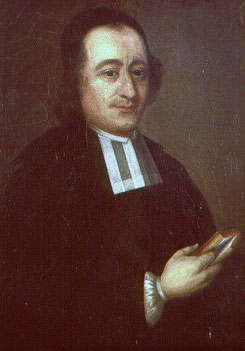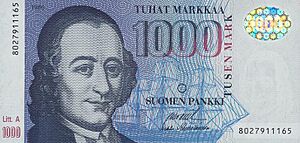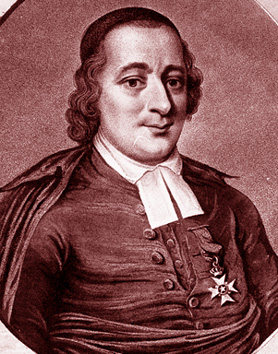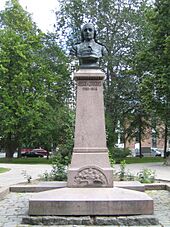Anders Chydenius facts for kids
Quick facts for kids
Anders Chydenius
|
|
|---|---|

Anders Chydenius
|
|
| Born | 26 February 1729 |
| Died | 1 February 1803 (aged 73) Gamlakarleby, Sweden (now Kokkola, Finland)
|
| Era | 18th-century philosophy |
| Region | Western philosophy |
| School | Liberalism, Age of Liberty |
|
Main interests
|
Mathematics, natural science, economics, political philosophy |
|
Notable ideas
|
Economic liberalism, freedom of religion, freedom of speech and migration |
Anders Chydenius (26 February 1729 – 1 February 1803) was a very important person in Swedish and Finnish history. He was a Swedish-Finnish Lutheran priest and a member of the Swedish Parliament, called the Riksdag. He is known as a leading thinker of classical liberalism in the Nordic region.
Born in Sotkamo, Finland (which was then part of Sweden), Anders Chydenius studied at the Royal Academy of Åbo. He became a priest and a philosopher during the Enlightenment. He was chosen to be a member of the Swedish Parliament in 1765–66. His political group, the Cap party, gained control. They helped create Sweden's first Freedom of the Press Act. This law was one of the most open in the world at that time.
Chydenius strongly disagreed with the old economic ideas of mercantilism. This system meant the government controlled trade a lot. He was forced to leave Parliament because he criticized some new government rules. Later, after a change in government in 1772, he returned to public life. He worked to increase people's freedoms and economic freedom. He helped stop torture as a way to question people. He also helped limit the use of the death penalty. He made it legal for Jewish and Catholic people to move to Sweden.
Eventually, the king became more powerful, and Chydenius lost favor again. He went back to his private life in Ostrobothnia. He died there at the age of 73. He was an early supporter of economic liberalism, freedom of religion, freedom of speech, and free movement. He wrote about the "invisible hand" of the economy ten years before Adam Smith published his famous book, The Wealth of Nations. He was one of the first thinkers to fully explain the ideas of liberalism.
Contents
Biography
Early Life and Studies
Anders Chydenius was born in 1729 in Sotkamo, a region now in Finland. His father, Jacob, was a chaplain. In 1734, his family moved to Kuusamo, where his father became a church rector. Anders grew up in the northern parts of Finland. He and his brother, Samuel, were taught at home by their father. Later, they attended grammar school in Oulu.
After a war between Sweden and Russia, the boys continued their studies in Tornio. In 1745, they entered the Royal Academy of Åbo (now in Finland). They also studied at Uppsala University in Sweden. Anders focused on mathematics, natural sciences, Latin, and philosophy. In 1746, his family moved to Kokkola.
Life in Nedervetil
In 1753, after finishing his studies, Anders became a preacher in Nedervetil. This area is now part of Kronoby in Ostrobothnia. In 1755, he married Beata Magdalena Mellberg. They did not have any children.
While in Nedervetil, Anders worked on many projects. He helped drain wet lands and tried new ways to grow crops. He experimented with different kinds of animals and plants. He also taught farmers how to grow potatoes and tobacco. His goal was to help people learn and improve their lives. Chydenius also practiced medicine. He became well-known for giving people vaccinations against smallpox. He even performed eye operations and made medicines.
Working in Parliament (Riksdag)
Anders Chydenius first wrote about practical things, like how to improve horse carriages. Then he started writing about bigger social issues. He became known as a strong writer and speaker. In 1765, he was sent to the Swedish Parliament, called the Diet. His main goal was to get free trading rights for towns in Ostrobothnia.
Before this, towns like Gamlakarleby and Vasa had to sell their goods, like tar, through Stockholm. This meant Stockholm made most of the money. Thanks to Chydenius's efforts, this rule was changed in 1765. The towns could now sell and ship their tar directly to other countries. This helped these towns grow and become more successful.
Chydenius was very active in Parliament. He wrote several articles that criticized the government. These writings caused a lot of discussion. One important result of his work was better control over the government's money. He believed his greatest achievement was expanding the freedom of the press. However, his strong actions led his own political party to remove him from Parliament in 1766.
Later Years in Kokkola
In 1770, Anders Chydenius became the rector (head priest) of Gamlakarleby. He focused on his church duties there. He also had his own orchestra and held concerts at the rectory. His father had lived in the parsonage from 1746 to 1766, and Anders lived there from 1770 until his death in 1803.
Between 1778 and 1779, Anders Chydenius returned to Parliament. He spoke up for the rights of servants and workers. He also helped pass a law that gave foreigners limited rights to practice their own religion. He was in Parliament again in 1793. He wrote about farming, making saltpeter, and fighting smallpox. He also wrote about settling Lapland. In his later years, he oversaw the building of an extension to the old church. He died in 1803.
Key Ideas
Anders Chydenius used his writings to challenge the old ways of thinking. He spoke out against mercantilism, which was a system where the government controlled trade and business very strictly. He also criticized conservatism, protectionism, and special privileges given to certain groups.
He believed that government jobs should not be bought or sold. He also thought the government should not limit or give special favors to anyone. He criticized the clergy (church leaders), nobility (rich families), and government workers. He said they lived off the hard work of farmers and common people. He wanted to change the discussion from how to keep workers poor to how to stop special privileges.
Many people at the time thought that farmers and workers had to be kept poor. This was to stop them from being lazy. But Chydenius showed that this was wrong. He argued that workers were not lazy. He said that if people were free to seek their own happiness, they would also help everyone else.
Chydenius believed in peace. He wanted people to have full and safe ownership of their land. He also wanted to give safety to refugees. He thought farmers and craftspeople should be able to sell their products whenever and wherever they wanted. He was against rules that set prices and wages. He also wanted workers to be free to choose their employers.
Free Trade and Economy
In 1765, Chydenius published a small book called The National Gain. In this book, he shared his ideas about free trade and industry. He looked at how the economy and society are connected. He also explained the basic rules for liberalism, capitalism, and modern democracy.
In this book, Chydenius wrote about ideas very similar to Adam Smith's "invisible hand" theory. He did this eleven years before Smith's famous book, The Wealth of Nations, was published. The "invisible hand" suggests that when people act in their own interest, it can benefit society as a whole.
Chydenius also tried to put his ideas into practice. He suggested to Parliament that towns along the Gulf of Bothnia should have much more freedom in trade. He wanted a "free state" with private ownership and individual freedom. He imagined a place where people could choose any job, trade would be completely free, and there would be no special privileges, rules, or taxes. He thought there would be very little government, with only a judge to make sure no one's rights were taken away.
Freedom of Expression
Chydenius was a strong supporter of freedom of the press. In a report from 1776, he wrote about how important it was. He said that freedom to write and print is a strong protection for a free country. Without it, leaders would not have enough information to make good laws. Also, people in power would not be watched closely. Citizens would not know their rights or what the law required. He believed that without this freedom, education and good behavior would suffer. He warned that ignorance would soon cover their freedom.
Natural Equality
Chydenius spoke openly about universal rights. He wanted to get rid of special privileges for certain groups. He wanted to give poor people the same freedoms as everyone else. He argued for the well-being of the poor, which was quite unusual for politicians at that time.
He supported democracy and defended freedom of religion, freedom of speech, and freedom of trade and industry. He also stood up for workers' rights. He called for careful checking of how government money was spent. In today's words, he wanted openness and good government.
In a 1778 essay, Thoughts Upon the Natural Rights of Servants and Peasants, he wrote that nature makes all people the same. He said that everyone is born with the same abilities and reason. This showed that the creator intended everyone to have equal rights.
Legacy

Anders Chydenius had a big impact on thinkers and politics in the Nordic countries. He strongly promoted classical liberalism. He is sometimes called the father of Swedish liberalism. Both Sweden and Finland see him as an important historical figure. He is considered either Swedish or Finnish by nationality.
Anders Chydenius is remembered as a person who was ahead of his time. His ideas were very new then, but they are now key parts of the Nordic way of thinking. He was also an Enlightenment thinker. He supported science, arts, logical thinking, and freedom. He was a scientist and a skilled eye surgeon. He made several inventions and was a pioneer in giving vaccinations in Finland. He even started an orchestra.
Chydenius was featured on the highest value banknote (1000 marks) of the Finnish mark's last design. There are also many places named after him in Kokkola. For example, the Chydenia Shopping Center was finished in 2006.
Anders Chydenius was also chosen as the main image for a special Finnish coin. This was the €10 Anders Chydenius commemorative coin, made in 2003. One side of the coin shows an open book, representing his many writings and the Bible. The other side shows a traditional village with a church.
In the book Historiens 100 viktigaste svenskar ("100 Most Important Swedes in History"), Chydenius was ranked as the seventeenth most important Swede. In Finland, he was ranked #40 in a list of "Greatest Finns" in a public vote.
The Chydenius family is still known in Finland today for its cultural contributions. The composer Kaj Chydenius is a distant relative of Anders.
See Also
- Contributions to liberal theory
- History of economic thought
 | Janet Taylor Pickett |
 | Synthia Saint James |
 | Howardena Pindell |
 | Faith Ringgold |



